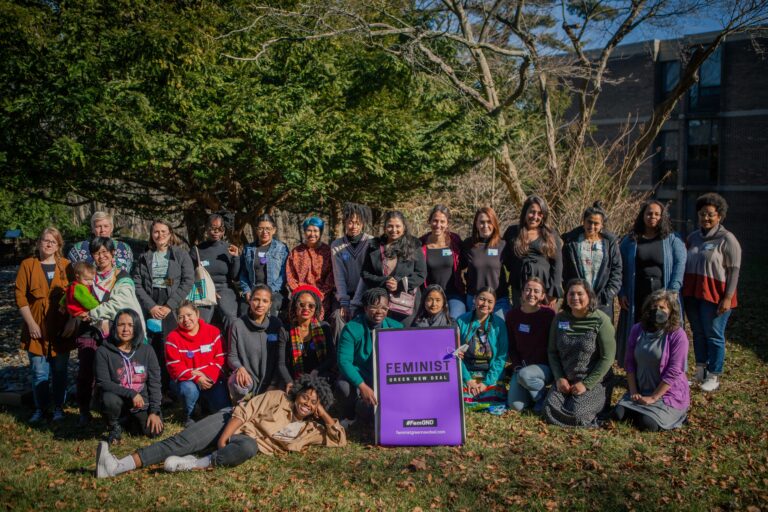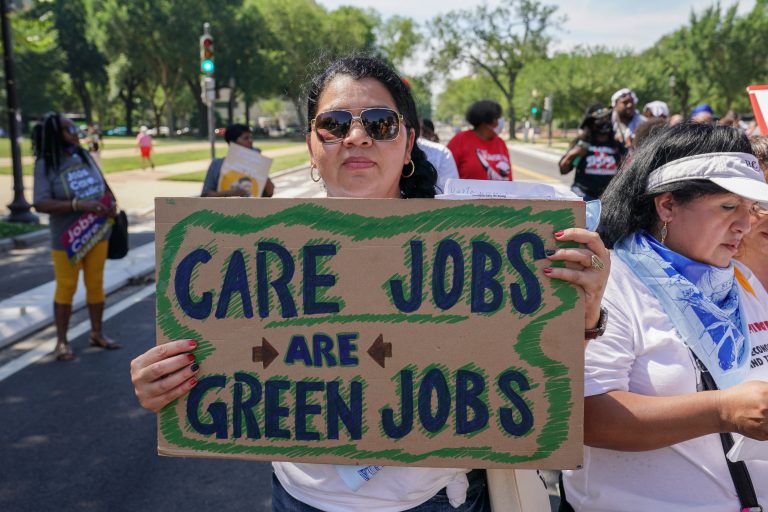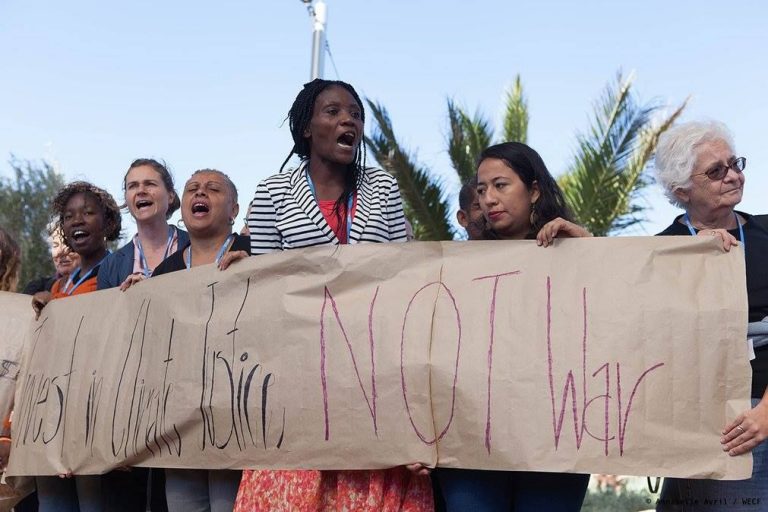Drafted by the Policy Working Group of the Feminist Green New Deal Coalition
COP26 didn’t just fail to meet the urgency of the climate crisis and the needs of frontline communities: it was a step backward that entrenched false climate solutions, including so-called “net-zero” and “nature-based agendas.” Industrialized, wealthy nations continued to dismiss, bully, and stonewall participants from the Global South and civil society even though these wealthy nations have failed to meet their own commitments to climate financing and rejected previously agreed-to language centering human rights. The corporate-friendly false solutions, like carbon markets, net-zero emissions, and financing tied up in loans, amount to carbon colonialism. In essence, billionaires, corporations, and wealthy nations will be able to buy their way out of the climate crisis while frontline communities around the world and Global South nations will face its worst harms.
Instead of a change in approach to the climate crisis between the Trump and the Biden administrations, we saw more of the “America First” strategy that has repeatedly blocked bold climate action, equity and differentiation for the Global South, and a continued exclusion of grassroots communities and gender justice advocates bringing the progressive justice-based policy solutions. We demand feminist, just solutions to our global climate catastrophe, rooted in care, collective approaches, community-led solutions, and reparations.
Climate Financing
The U.S. is the world’s largest historical emitter and the wealthiest nation, yet has failed on climate finance commitments. We wanted to see the Biden administration address its climate debt to the Global South through ambitious and urgent emissions reductions; unprecedented commitments to climate finance; robust financing for loss and damage; global debt relief and economic justice measures including support for up to $3 billion in Special Drawing Rights; and reparations for impacted communities, including women and girls in all their diversity. Instead, here is what we got:
- Donor nations didn’t meet past climate financing commitments and the commitments made at COP26 do not reflect the urgency, or meet the needs, of the climate crisis.
- At the 2009 COP, donor nations committed to spend $100 billion per year. But again this year, commitments to reach that goal were not made. The discussion around more serious pledges was pushed to 2023. This year, wealthy, carbon-emitting only committed to provide “additional” funding.
- The U.S. failure to provide climate financing commensurate with its historical emissions and the size of its economy is especially stark. According to calculations by the World Resources Institute, the U.S. should contribute 40-47% of the $100 billion, depending on whether the calculation addresses wealth, past emissions, or population. Instead, the U.S. average annual contribution to climate financing from 2016 to 2018 was only around $7.6 billion.
- Donor nations committed to provide $1.7 billion over the next four years to fund Indigenous-led climate solutions through public and private funding, but this commitment is inadequate and insecure. Without loss and damage financing, with donor nations failing to meet past financial commitments, and with unclear mechanisms for civil society consultation, we are deeply concerned that this will be another empty promise to Indigenous leaders.
- To-date, 71% of the climate financing provided by donor countries to the Global South has been loans. This does not represent a real transfer of wealth to the Global South and climate financing should not worsen the debt crisis in low and middle income countries.
- While COP26 did see numerous new commitments on adaptation finance and a new agreement from developed countries to double adaptation finance to $40 billion per year, this is still far short of the need for adaptation finance and does not achieve a balance between mitigation and adaptation finance.
Loss and Damage
- Robust financing for loss and damage is a matter of justice and repair. Global South countries least responsible for the crisis are experiencing the brunt of its effects — from severe droughts to devastating typhoons to economic repercussions.
- Going into COP26, there was significant and optimistic momentum for the creation of a loss and damage financing structure.
- Almost every single country supported the creation of a loss and damage facility, but the U.S, Australia, and EU ultimately blocked it. This is an abdication of responsibility for the harms caused by industrialized countries’ carbon emissions. The outcome was a compromise to continue discussions at the Glasgow Dialogues for Loss and Damage Finance over the next two years.
Adaptation
- A central pillar of the Paris Agreement is to strengthen resilience and reduce vulnerabilities to the impacts of climate change. At COP26, countries agreed on a work programme to establish a Global Goal on Adaptation between 2022-2024.
- While adaptation continues to receive more and more attention, progress towards adaptation is still lagging behind mitigation efforts. However, the world’s most vulnerable communities are already experiencing the devastating impacts of climate change now and need support to respond and adapt.
- Global leaders must also deepen commitment to a shift towards locally-led adaptation, building on over 70 endorsements of the Principles for Locally-Led Adaptation which are designed to shift power and resources to local communities on the frontlines of climate change to build resilience to climate impacts.
Net Zero and Carbon Markets
- “Net zero” framing is a trap that leaves far too much space for false and harmful climate solutions — like carbon trading and offset programs which allow companies to pay to pollute and place human rights at risk by enabling land grabs, including on Indigenous territories — and relies on expensive, often untested, technologies for carbon capture and geoengineering.
- The US administration’s promise to reach net zero emissions by 2050 is not the urgent, ambitious action we need to confront the scale and speed of the climate crisis. “Net zero” action by 2050 is too little, too late.
- Wealthy nations are pressuring the Global South to accept net-zero commitments, carbon markets through Article 6, and climate financing in the forms of loans. These programs would let donor nations essentially buy their way out of the climate crisis by shifting the burden of financing the real costs of climate adaptation and loss and damage onto Global South nations that are already deeply impacted by the climate crisis. This is carbon colonialism.
Fossil Fuels
- Climate justice requires a just, 100% transition to renewable energy that is rights-based, justly sourced and that divests from the mining, fossil fuel, and agribusiness-based economy that fuels climate change.
- COP26 was the first time fossil fuels were mentioned in a COP, and the debate surfaced a fundamental division over coal versus oil and gas. Wealthy nations were willing to commit to phasing out coal, a key resource for developing nations, but were unwilling to commit to phasing out oil, a key resource and income stream for rich nations that has led to environmental degradation and exploitation particularly impacting Indigenous, Black, and brown communities.
- The US propelled a narrative of countries like India and China as “big spoilers,” evading its own responsibility for continued fossil fuel extraction.
- In negotiating on fossil fuels, the economic burden on the Global South grew with a focus on coal instead of oil, and language to “phase out” fossil fuels was watered down to “phase down.”
Militarism
- The U.S. military alone is a bigger polluter than approximately 140 countries, but military emissions are exempt from these climate negotiations — a point defended by the US congressional delegation.
- At COP26, thanks to civil society participation, there was a very loud, political debate around militarization that was highlighted both in outside actions and formal discussions.
- Climate refugees were dehumanized and discussed as a security concern rather than to address their needs as a human rights and climate justice issue.
- This posture reflects amnesia for the historic responsibility of the United States in creating climate disasters globally through war and extraction policies.
Challenging US Policy
- Any hopes for a substantive change of posture from the Biden administration compared to the Trump administration were sorely disappointed. Instead, Biden sent essentially the same team to climate talks that Trump did, and the same tactics of bullying and gaslighting were used by its negotiators.
- At COP, the US played a central role in shaping and driving unjust and colonial policies, including failings around international climate financial commitments, loss and damage, and more.
- Throughout COP26, the U.S. led a PR and pressure campaign for Global South nations to accept their proposals as-is. This was an unacceptable posture that erased the history of these talks and the urgency going into them.
At COP26, wealthy nations entrenched corporate interests while systematically failing to address the urgent priorities and transformative proposals of grassroots communities and gender justice advocates.
A just transition cannot prioritize corporate interests over human needs. As the coalition for a Feminist Green New Deal, we envision a low-carbon care economy that will provide the economic and social support that communities around the world will need to deal with ongoing and future climate impacts.
Additional Resources and Actions
- Feminist Green New Deal: Press Conference at COP26 (Recording)
- Women & Gender Constituency (WGC) Press Statement: The Power is With Us: COP26 Fails People & Planet
- It Takes Roots: Statement on the Conclusion of COP26 and the Glasgow Climate Pact
- Women’s Earth and Climate Action Network (WECAN): COP26 Analysis with Action Updates
- GGJ: No War No Warming Pledge: Ask Your Member of Congress to sign
- FemGND Congressional Briefing pre-COP: “Feminist Global Justice Demands of the U.S. for COP26” – in English and Spanish
- Sunrise: Civilian Climate Corps Explainer with Action Steps
- While the Build Back Better Act seeks to invest in communities and combat the climate crisis, the bill as written contains measures that would subsidize fossil fuel industries, and fail to transition the country to renewable energy and reduce emissions at the pace and scale needed to reverse the climate crisis. Read more.


